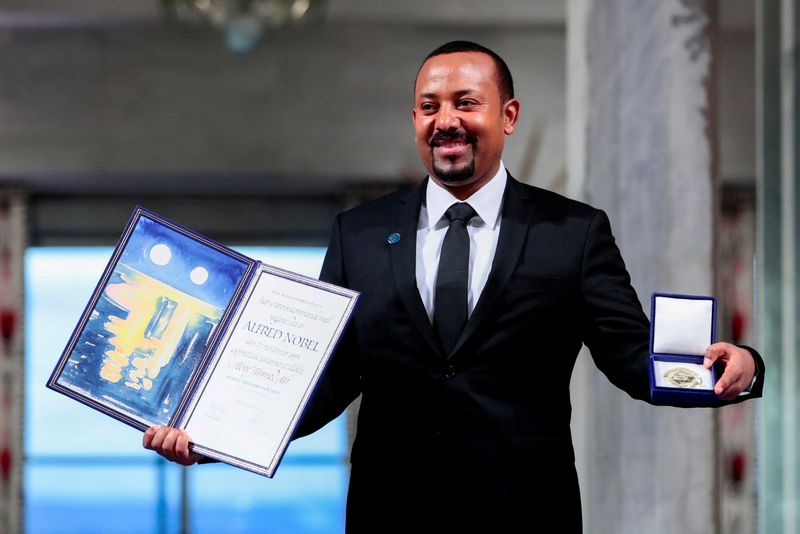By Katharine Houreld and Maggie Fick
NAIROBI/ISTANBUL (Reuters) - Ethiopian Prime Minister Abiy Ahmed's political slogan is "medemer" - or "coming together". But some analysts say reforms meant to unify Ethiopia have inflamed simmering ethnic and political divisions and risk unravelling Africa's second most populous nation.
Now Ethiopian unity faces its severest test yet: since Nov. 4, the military has been battling a group that once dominated the national government - the Tigray People's Liberation Front (TPLF) in the northern Tigray region.
The TPLF frames the conflict as a battle for the rights of Ethiopia's 10 regions against a premier bent on centralising power. They say Abiy has discriminated against Tigrayans since he came to power and have referred to his rule as an "illegal, unitarist and personalistic dictatorship".
The government denies trying to centralise control.
Three major decisions infuriated the TPLF, which dominated the governing coalition for nearly three decades until Abiy came to power in 2018: Abiy's rapprochement with their arch-enemy, the nation of Eritrea; his replacement of an ethnically based coalition with a new national party; and the postponement of national elections.Each sparked bitter recriminations from the TPLF. The ensuing conflict has sent ripples through the region.
Ethiopia, a regional heavyweight, is home to the African Union; its security forces serve in peacekeeping missions in Somalia and South Sudan and work alongside Western allies against Islamist militants.Leenco Lata, a veteran opposition leader, said the federal system is under pressure from both sides as debate polarises between supporters of closer unity or separation. Abiy says he's tried to work with the TPLF, but has been repeatedly rebuffed; his office published a timeline of such attempts this week.
The government says Tigrayan forces started the conflict by attacking federal troops stationed there. The TPLF have described the attack as a pre-emptive strike.
Underlying the political struggle are long-standing rivalries between Ethiopia's 80-plus ethnic groups. Many regional leaders see Abiy's democratic reforms as a chance to grab more power for their own group. Zemelak Ayele, a professor at Addis Ababa University, said even though citizens resented the previous repression, the TPLF might have grudging support from some regional leaders who consider it a bulwark against a more centralised government."Even those who are ardent detractors of TPLF are not necessarily ardent supporters of the war (in Tigray)," he said. "Some might feel the federal system might be in danger if the TPLF is out of the picture."
AN OLD ENMITY AND A NEW PEACE
The secretive, highly militarised nation of Eritrea - often nicknamed "Africa's North Korea" - lies along Ethiopia's northern border. Eritrea won independence from Ethiopia in 1991 following three decades of war. Conflict over a border dispute broke out again from 1998-2000; tens of thousands died.
The TPLF spearheaded that war. They regard Eritrea as an arch-enemy.
Months after Abiy came to power, he signed a peace deal with Eritrea in 2018 and was subsequently awarded the 2019 Nobel Peace Prize. Regular visits began between Abiy and Eritrean President Isaias Afwerki, drawing accusations from the TPLF that Abiy was "serving as a vehicle for Isaias’s desire to extract a pound of flesh for perceived wrongs".
Billene Seyoum, Abiy's spokeswoman, said the TPLF was trying to "internationalise the conflict" and that intelligence reports suggested the TPLF had been manufacturing Eritrean and Ethiopian army uniforms.
The TPLF has fired missiles at its capital Asmara and says Eritrea is now fighting alongside Ethiopian troops in Tigray, which Ethiopia denies.
Reuters has not been able to reach the Eritrean government for comment for two weeks.
THE PROSPERITY PARTY
After the Eritrea treaty, Abiy consolidated domestically. Last year he replaced Ethiopia's old ruling coalition, made up of four ethnically based parties, with a single pan-Ethiopian party. Out of the four, only the TPLF refused to join.
Abiy underestimated the TPLF's bitterness at losing power, said one Ethiopian academic.
"It is a bitter divorce and Abiy did not have a plan for a peaceful exit for TPLF," the academic said, speaking anonymously to avoid angering the government.
Inflammatory rhetoric on both sides made Tigrayan people feel under siege, boosting support for the TPLF, he said.
Alex de Waal, a professor at Tufts University, said launching the new party so quickly may have been a miscalculation: the old coalition had become a rare forum for negotiation in a nation where political dissent often meant prison.
But Abiy was in a hurry. National elections were due in August 2020 and his new party needed to compete against a plethora of new ethnically based groups.
Then the pandemic arrived.
DELAYED ELECTIONS
The government postponed elections. Many opposition groups reluctantly agreed, but not the TPLF. They held their regional elections in September anyway. Both sides accused each other of ignoring the constitution.
The TPLF won by a landslide. The House of Federation, a legislative body dealing with constitutional matters, voted to cut Tigray's budget.
On Oct. 29, Tigrayan forces refused to let an Ethiopian general who flew into the regional airport leave to take up his command in the capital Mekelle.
On Nov. 4, the government reported Tigrayan soldiers attacked a base in Dansha.

The conflict had begun.